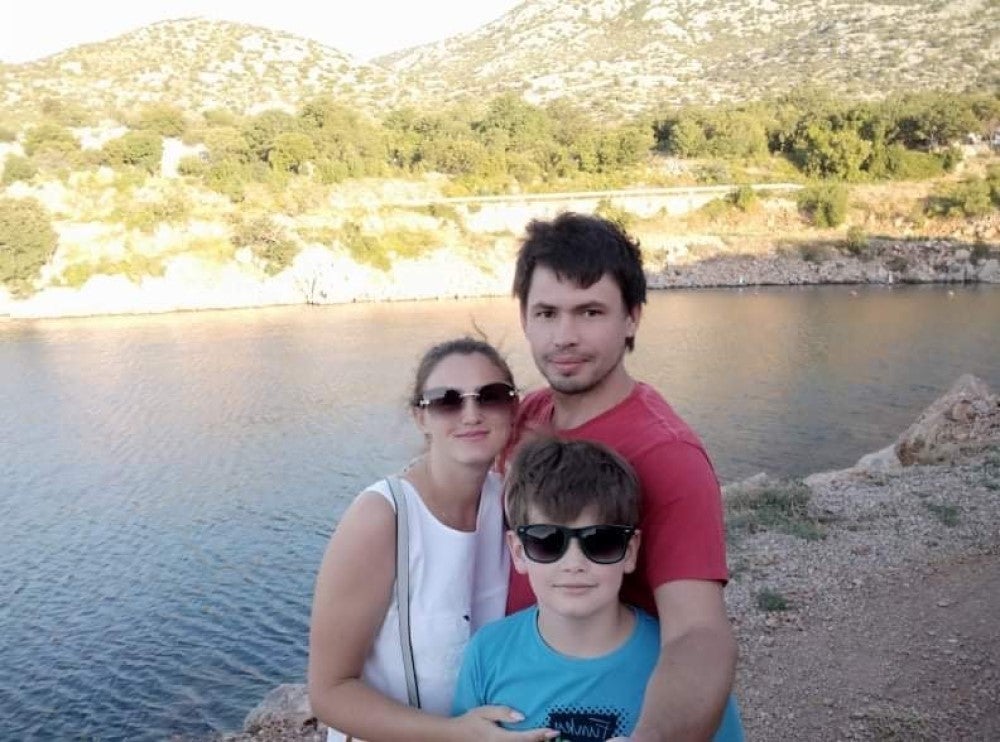It might become my last day: Ukrainian describes Russian soldiers searching home
‘It’s not pleasant to be in front of a weapon, just pointing at you,’ Andrii Lysogor said.

Your support helps us to tell the story
From reproductive rights to climate change to Big Tech, The Independent is on the ground when the story is developing. Whether it's investigating the financials of Elon Musk's pro-Trump PAC or producing our latest documentary, 'The A Word', which shines a light on the American women fighting for reproductive rights, we know how important it is to parse out the facts from the messaging.
At such a critical moment in US history, we need reporters on the ground. Your donation allows us to keep sending journalists to speak to both sides of the story.
The Independent is trusted by Americans across the entire political spectrum. And unlike many other quality news outlets, we choose not to lock Americans out of our reporting and analysis with paywalls. We believe quality journalism should be available to everyone, paid for by those who can afford it.
Your support makes all the difference.A Ukrainian father has described feeling like it “might become my last day” when groups of armed Russian soldiers searched his family home.
Andrii Lysogor, 39, left the capital the day after Russian military attacks first began on February 24, with his wife and 10-year-old son.
The family then stayed with Mr Lysogor’s wife’s parents in the village of Babyntsi, around 70 kilometres (43 miles) from Kyiv, where three separate groups of Russian military personnel knocked on their door on the same day.
“It’s not pleasant to be in front of a weapon, just pointing at you,” Mr Lysogor, a software engineer, told the PA news agency.
“When you’re in front of a gun, it’s quite an unusual experience… a new experience, that (if) I do something wrong it might become my last day.
“They were looking for weapons and Ukrainian soldiers.”
Mr Lysogor said after they had checked the house and were satisfied “nobody was hiding there”, the Russians took their mobiles’ SIM cards to prevent them from making calls.
“Nobody was trying to apply force, they were speaking with us… my feeling was that they’re just professionals, the war is just their work,” he added.
The family had been regularly moving to the basement when they heard military attacks on neighbouring towns, and decided to leave Babyntsi on Saturday – Mr Lysogor’s birthday – when a “sequence of tanks” arrived.
“Nobody was shooting our territory, we felt more or less safe, but later, a sequence of tanks came to our village and one of them stays next to (us), almost in front of our door,” he said.
“You can imagine how you will feel yourself when the tank is next to you.
“The fact that me and my family are in a safe place is the best (birthday) present I can imagine.”
The fact that me and my family are (now) in a safe place is the best (birthday) present I can imagine.
Mr Lysogor and his family drove to Rivne, western Ukraine, and at one point had to divert because of mines.
“There was a sign that there are mines ahead, and it was on our road – we needed to take a decision to either move forward or not,” he said.
“We continued to move… we discovered Russian soldiers that started to say it was truly dangerous to move forward, that it was war in action in front and most likely that we will be killed if we try move forward.
“So we go back a couple of kilometres and start looking for another direction.”
Mr Lysogor and his family continued driving with a group of 50 other cars until they reached the motorway, arriving at their destination in Rivne after an eight-and-a-half-hour journey.
The family are now staying in a hotel but plan to look for permanent accommodation there, as Mr Lysogor and his family try to take their “brains back to normal reality”.
“I never imagined that in Europe we can be at war again,” he said.
“I am trying to adjust my understanding to the fact that war is happening in our country.
“It’s a new normal.”
Mr Lysogor said the decision to leave his parent-in-laws’ home was “truly hard”.
“We understood that there are very few chances that everything will remain the same, whenever we return there are very few chances that the house will be untouched,” he said.
“We saw they just parked the tanks in front of houses, like normal cars… it was quite a scary picture.”
Mr Lysogor compared the scene to a video game.
“We saw bombs in front of us, multiple pieces of rockets, burnt tanks and other equipment,” he said.
“If you look for pictures from a scary shooter computer game, it’s very similar – everything is black, everything is damaged, nothing alive.”